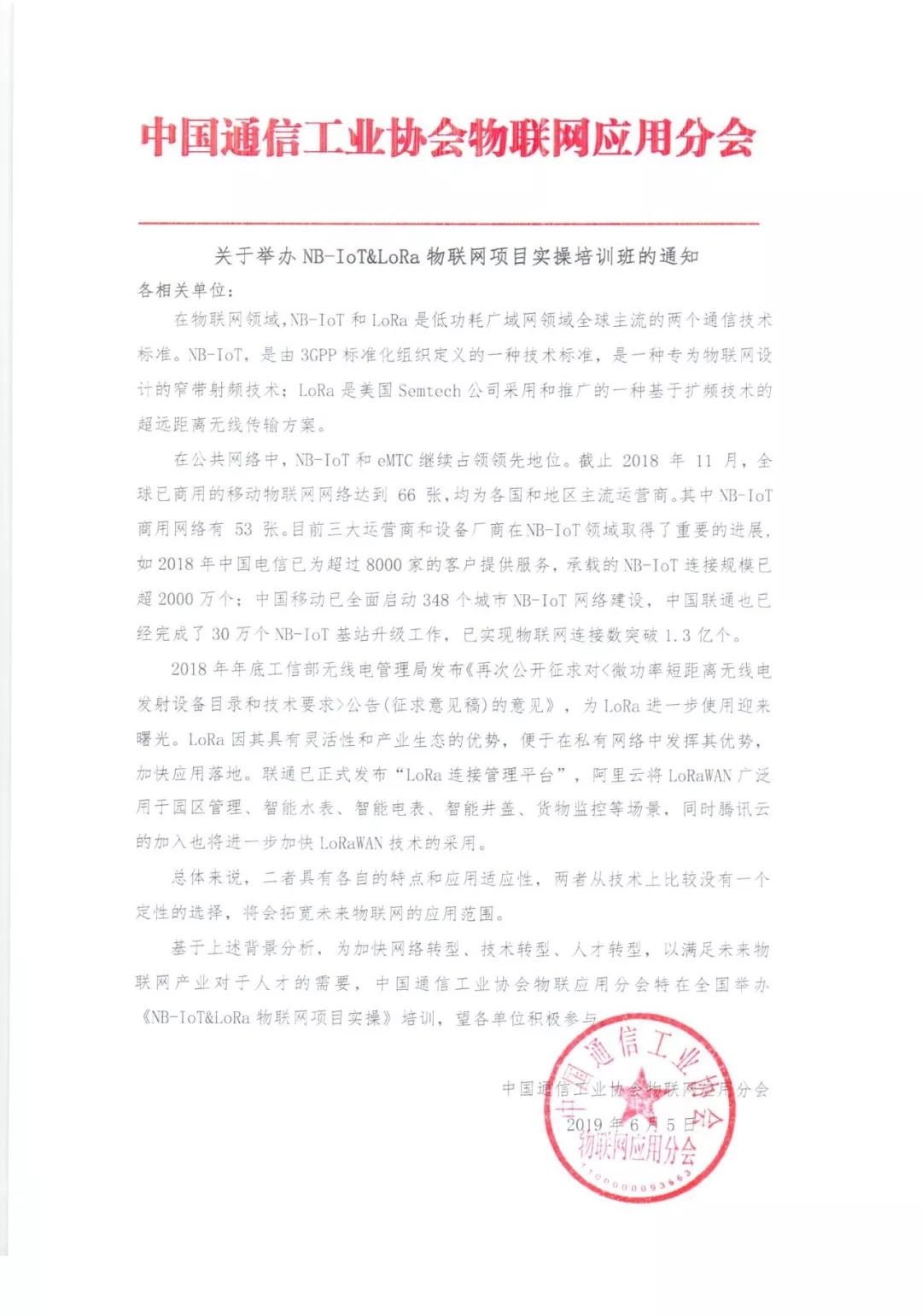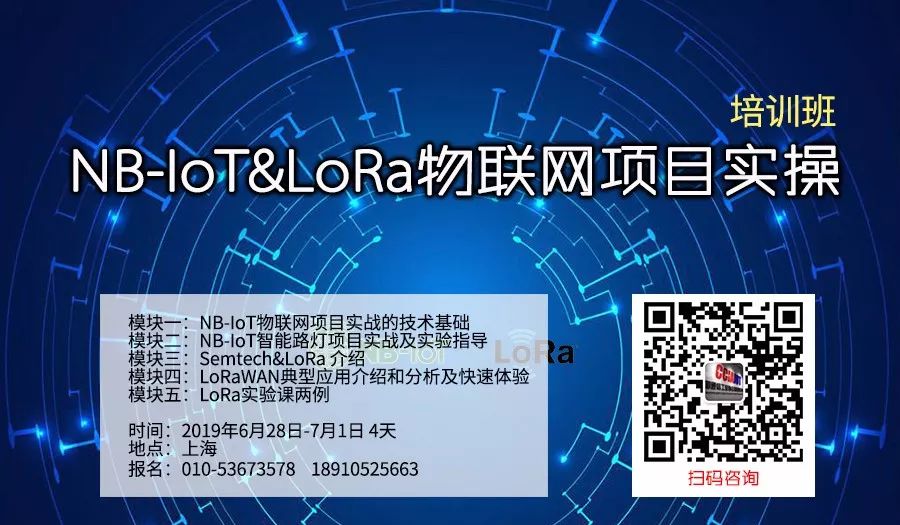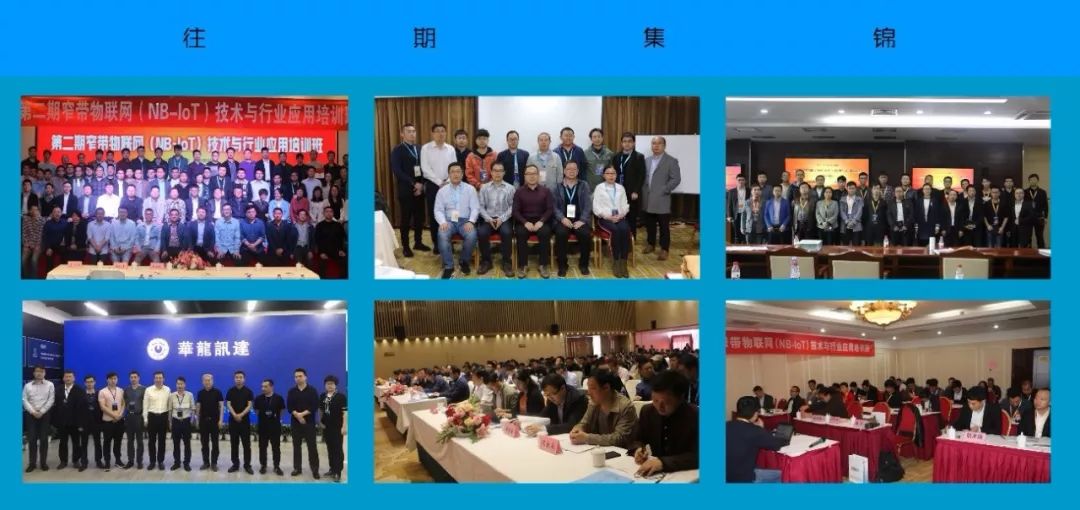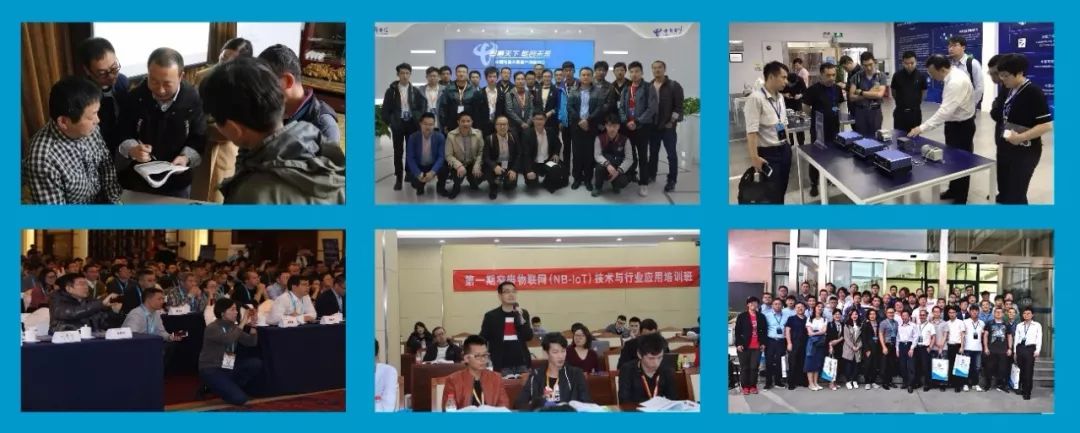
Attachment 1: Introduction to the NB-IoT & LoRa IoT Project Hands-On Training (June 2019)
Time: June 28 – July 1, 2019 (4 days)
Location: Shanghai
Organizer: China Communications Industry Association IoT Application Branch
Target Audience: Communication planning and design institutes, communication engineering companies, information and communication consulting firms, IoT solution providers, research institutions, and major universities.
Course Outline:
|
Module 1: Basics Technical Foundations of NB-IoT IoT Project Practice |
1. NB-IoT Network Architecture and System Components 1.1 NB-IoT System Architecture 1.2 NB-IoT System Architecture 1.3 End-to-End Network Architecture and Components of NB-IoT 1.4 End-to-End Networking Solutions for NB-IoT (Physical Connection) 1.5 Connection Methods (Logical Connection) Between Components of the NB-IoT Network 1.6 Introduction to Main Network Elements in NB-IoT Architecture 1.7 Protocol Description of End-to-End Solutions for NB-IoT 1.8 Fusion Networking Solutions for Regular 4G Services and NB-IoT EPC Core Network 2. Key Technologies and Applications of NB-IoT 2.1 Introduction to Key Technologies of NB-IoT 2.2 NB-IoT Spectrum Solutions 2.3 NB-IoT Frame Structure 2.4 NB-IoT Air Interface Technology 2.5 Technology Solutions for Enhancing Gain in NB-IoT 2.6 Technology Solutions for Large Connections in NB-IoT 2.7 Power Saving Operating Modes for NB-IoT 2.8 Low-Cost Technology Solutions for NB-IoT 2.9 Mainstream Manufacturers of NB-IoT Chips and Modules 2.10 Competitive Advantages of NB-IoT Modules 3. Network Signaling Process of NB-IoT 3.1 Communication Methods Between Components of the NB-IoT Network 3.2 Access Protocol S-lite for NB-IoT eNodeB and EPC Core Network 3.3 Changes in Mobility Management and Session Management of EPC Core Network After Introducing NB-IoT Services 4. Introduction to NB-IoT IoT Platform 4.1 Main Functions of NB-IoT IoT Platform 4.2 Introduction to Southbound Interfaces (Device Integration) 4.3 Introduction to Northbound Interfaces (Application Integration) 4.4 Integration of NB-IoT Terminals with IoT Platform 4.5 Integration of Business Platform with IoT Platform |
|
Module 2: Practical Training Hands-On Training and Experimentation for NB-IoT Smart Streetlight Project |
5. Introduction to Development Environment and Software for NB-IoT Smart Streetlight Project 6. Experiment 1: Online Development and Validation of Profile and Plugin 6.1 Log in to OceanConnect Platform, Create Application 6.2 Design and Write Profile File 6.3 Design Data Stream and Develop Codec Plugin 6.4 Report Data via NB-IoT Simulator, Validate Profile and Codec Plugin 7. Experiment 2: Northbound Development Experiment on OceanConnect Platform 7.1 Use Postman to Call Authentication Interface 7.2 Use Postman to Call Directly Connected Device Registration Interface 7.3 Use Postman to Call Modify Device Information Interface 8. Experiment 3: Data Reporting Experiment for NB-IoT Module 8.1 Introduction to Development Board 8.2 Configuration of NB-IoT Module for Network Access and Data Reporting 9. Experiment 4: Platform Command Issuance and Device Command Response Experiment 9.1 Modify Profile File 9.2 Modify Codec Plugin 9.3 Issue Platform Command 9.4 NB-IoT Module Reports Command Response 10. Experiment 5: Huawei LiteOS Porting Development Experiment 10.1 Port Huawei LiteOS Operating System 10.2 Validate LiteOS Porting Results 11. Experiment 6: End-to-End IoT Experiment Based on LiteOS 11.1 Port Light Sensor Code Based on LiteOS 11.2 Port NB Module Code Based on LiteOS 11.3 Receive Issued Commands, Execute and Respond 11.4 LiteOS Debugging onelight – Run LiteOS onelight demo |
|
Module 3: Introduction to Semtech & LoRa |
12. Introduction to Semtech & LoRa 12.1 Introduction to Semtech & LoRa, Global and Domestic Market for LoRa, Typical LoRa Applications, etc. 12.2 LoRa Alliance and LoRaWAN Protocol 12.3 Introduction to LoRa Products 12.4 LoRa Demo and Q&A 13. LoRa Development Support 13.1 Introduction to Open Source Hardware Resources on Semtech’s Official Website 13.2 Introduction to LoRa Software Resources 13.3 Other Technical Issues Related to LoRa 13.4 Introduction to SX1280 + SX1280 Demo Demonstration |
|
Module 4: Introduction and Analysis of Typical LoRaWAN Applications and Quick Experience User Guide |
14. Introduction and Analysis of Typical LoRaWAN Applications 14.1 Application of LoRaWAN in Metering Industry 14.2 Application of LoRaWAN in Smart Fire Protection 14.3 Application of LoRa in Smart Community 14.4 Application of LoRa in Farm Environmental Monitoring 15. Quick Experience User Guide for LoRaWAN 15.1 Introduction to Lierda LoRaWAN Module M91 15.2 Introduction to Lierda LoRaWAN Development Board 15.3 User Guide for ZTE CLAA Platform Server 15.4 Sending and Receiving Experimental Data Set. |
|
Module 5: Two Examples of LoRa Experiments |
16. Experiment 1 (Temperature Alarm Reporting Experiment Based on Class A) 16.1 Description of Functionality Achieved in Experiment 16.2 Modify Code to Configure Node for Class A 16.3 Write Code to Obtain Temperature from Temperature and Humidity Sensor 16.4 Achieve Temperature Alarm Data Reporting Functionality 17. Experiment 2 (Remote Control of LED Light Based on Class C) 17.1 Description of Functionality Achieved in Experiment 17.2 Modify Code to Configure Node for Class C 17.3 Write Code to Receive Data Issued by Server 17.4 Achieve LED Switch Functionality Based on Issued Data Content |
Invited Instructors:
Li Wenyiao, Associate Professor, Wuhan University of Posts and Telecommunications
Associate professor, master’s supervisor, national excellent teacher. Graduated in 1991 from Beijing University of Posts and Telecommunications, expert in various communication networks and technologies in the domestic communication industry, senior lecturer in the national communication industry, senior network architect, senior consultant, evaluator of the Communication Industry Vocational Skills Appraisal Center of the Ministry of Industry and Information Technology, member of the expert group of the China NB-IoT Industry Alliance, senior trainer at Wuhan University of Posts and Telecommunications and Fenghuo Technology Group, editorial board member of “China Optoelectronics” magazine, invited contributor to “Communication World” magazine, recognized as a pioneer in communication industry technology in 2011-2012, and awarded the title of national communication industry “Gold Medal Training Instructor” in 2012.
Li Weidong, IoT Industry Market Director, ZTE Kela Technology Co., Ltd.
26 years in the information industry. Experience in R&D, system solutions and architecture design, standards, industry solutions, and market work, has published multiple professional articles in communication, power, broadcasting, and gas industry magazines, with certain experience in integration of IT and CT.
Liu Gang, Regional Market Director, Semtech
Zhang Xue, Technical Support Engineer, Semtech
Liu Yang, RF Application Engineer, Semtech
Zhang Xi, Product Application Technology Expert, Wireless Sensor Network Product Department, Lierda Technology Group, Zhejiang
Graduated from Zhejiang University of Technology with a major in Electronic Information. Long-term engaged in design and R&D of IoT application products and smart home products. Participated in the construction of the “Ali Xiaozhi” smart home platform, as well as the “Lierda LoRaWAN IoT” platform. Focused on the development of high-performance and low-power wireless products, the logistics park LoRaWAN positioning card, LoRaWAN water meter, LoRaWAN-485DTU, and other products designed have been widely used in the industry.
Course Fee:
4180 RMB/person (includes four days of lunch, materials fee, certificate fee, NB-IoT development board, LoRa development board, etc.), accommodation is arranged uniformly, expenses are self-managed.
Course Format:
This course adopts a modular teaching method, combining theoretical lectures, case analysis, hands-on operation, interactive discussions, instructor comments, and other teaching methods to integrate IT and CT technologies with a large number of practical cases, achieving the goal of applying what has been learned to solve practical problems.
Certificates will be awarded to participants who pass the assessment.

Previous Sessions Review:

